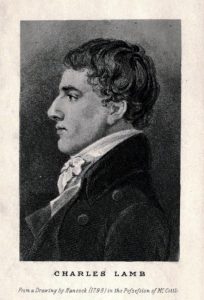Early Life of Lamb
Lamb went to school at Christ’s Hospital, and studied there until 1789. In 1792 he worked in the East India House, which was the head of the East India Company. In 1796 his sister, Mary, in a fit of madness killed their mother, leading to Lamb taking the responsibility of her care upon himself. He remained at the East India House until retirement in 1825.
Writing and Career of Lamb
His first literary attempts were of writing poetry, which he contributed to collections by Coleridge (1796) and by Charles Lloyd (1798). His best known poem was “The Old Familiar Faces”, which was published in 1789. Another poem, which was titled, “On an Infant Dying As Soon As It Was Born”, which was published in 1828 is his finest poetic achievement.
In 1807 Lamb and his sister published Tales from Shakespeare, which was a retelling of the plays for children. He published other works for children such as Mrs. Leicester’s School, and a children’s version of the Odyssey, called ‘The Adventures of Ulysses’. He also published critical papers on Shakespeare which often appears in the form of marginalia, reactions, and responses.
His greatest literary achievements were his remarkable letters and the essays that he wrote under the pseudonym Elia for London Magazine. The style of writing is highly personal and mannered, and Lamb intended for it to “create” and delineate the persona of Elia. His essays were whimsical and often nostalgia about his childhood experiences, but beneath their whimsical surface, they are as an expression of the Romantic movement.
His love of urban and suburban subject matter is highlighted in the essays. But this, in turn, points ahead, toward the work of Dickens. One particular essay titled, “On the Artificial Comedy of the Last Century” helped to revive interest in Restoration comedy. The first Elia essays were published separately in 1823; a second series appeared, as The Last Essays of Elia, in 1833.
What was Charles Lamb’s pen name?
“Elia” was the pen name Charles Lamb which was used as a contributor to The London Magazine
